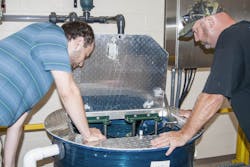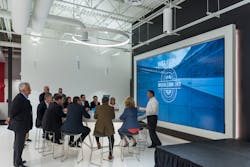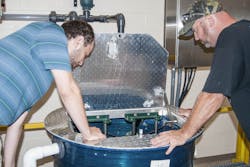Educating the Professional Plumber
Plumbing contractors today are bombarded by new technology and ideas -- in the software they use in the office, in the apps they use on their mobile devices, and in the products they install and service. This series of articles will explain why training is critical for plumbing contractors in order to be competitive, successful and able to grow their businesses.
Changes in plumbing products over the last couple of decades have centered on ease of installation, ease of use, enhanced performance, connectivity, water conservation and energy efficiency. Teaching contractors what they need to know about the ever-changing plumbing industry is a responsibility shared by all the industry’s stakeholders. Providing training options allows contractors to ensure that field technicians learn how new products work via hands-on exercises, classroom instruction and online reinforcement.
“The industry has had several changes over the last few years, and manufacturers are finding it necessary to build training programs to communicate those changes through technical training events,” notes Rob Wagner, senior contractor outreach manager at Rheem Water Heating. “Our commitment to innovation is a smart business decision to grow the relationship between the manufacturer and plumber, and will ensure business growth for both.”
Part of the commitment includes providing a state-of-the-art venue for contractors to learn. In June, Rheem Water Heating opened its new headquarters facility in the Atlanta metro area, which includes a 10,000-sq.-ft. Innovation Learning Center. One of five the company intends to build this year, the training space includes interactive classrooms, a live demonstration lab for troubleshooting and product evaluations for diagnostic training.
Rheem’s Innovation Learning Center in the Atlanta metro area is one of five the Water Heater Division intends to open. The centers are designed to "help plumbers become more efficient at what drives them to be a plumber," notes Rob Wagner, senior contractor outreach manager at Rheem Water Heating. That includes customer interaction as well as product training. Photo credit: Rheem Water Heating
“The goal of our training is to help provide real-world application solutions for more efficient installation and faster service calls,” Wagner explains. “Our ongoing commitment to plumber support has grown out of demand from our customers for flexible continuing education and hands-on technical training.”
In Louisville, Ky., pump manufacturer Zoeller Company expanded its headquarters campus to include its 6,000-sq.-ft. Center For Excellence. This learning environment is made of a state-of-the-art, flexible layout classroom for lecture and multimedia presentations and an industrial-style demonstration laboratory with its own closed-water system. Up to 15 stations use the closed-water system to demonstrate functioning products in working applications while recycling all water used in trainings.
For contractors, wholesalers, engineers and other plumbing professionals, the Center For Excellence staff tailors training sessions to cover what each group wants to learn, from how pumps work to installation in hazardous locations to the benefits of a sump pump in a home. This training is dominated by hands-on sessions in the demo area, working with actual products to understand how they work.
“For every hour in the seat, we want to have two hours in the demo area,” says Dwight Newton, Zoeller’s corporate employee development manager. “If engineers come in, we’re going to spend a lot more time on the pump curves, on the draw and the amps, because that’s what they’re going to be asking about. In the demo center, we have an area set up where we monitor that. When we do a duplex system or a simplex system, they can see the changes, and we can talk about what it means. The demo area is an ever-changing, ongoing process because we want it to be as personalized as it can be.”
Wagner, a 30-year veteran in the plumbing-heating-cooling industry, agrees that allowing plumbers to physically work inside water-heating units helps them to better understand how they are designed, engineered and manufactured.
“The value of opening five Innovation Learning Centers is having the opportunity to focus on hands-on, face-to-face interaction, outreach and support for plumbers,” he adds. “Plus, they have the ability to record training to post on Rheem Academy via online training modules.”
Newton notes that the increased interest in how-to videos on YouTube is a good indicator of how important hands-on training is to educate users on products.
“Industry hands-on training is becoming more and more vital because that’s where people are going, what they expect,” he explains. “Little three- or four-minute YouTube videos on how to do something, how to troubleshoot something, how to pick or choose among various products or applications; that’s a big thing our customers are driven by now.”
Both men agree that more plumbing contractors today are taking advantage of product training in all its forms.
“As product innovation and technical enhancements increase dramatically year-over-year, we know plumbers are constantly looking to stay ahead of the game,” Wagner says. “We worked with plumbers to develop the curriculum for our Innovation Learning Centers; we shaped our training and outreach to address daily, on-the-job challenges expressed by them. The goal is to help our partners increase their product knowledge, speed up service call time and maximize the efficiency of their resources.”
Newton notes: “I believe this is one of the biggest reasons training is gaining popularity — the industry is changing. One thing I hear all the time is the plumbing industry is a good industry as far as pay, compared to other industries. So you’re getting folks who want to go where the pay is good, where they are able to control their destiny, but they didn’t grow up in this industry.”
Rheem’s new training centers are designed to “help plumbers become more efficient at what drives them to be a plumber,” Wagner explains. Several classes focus on customer interaction — from offering solutions in person or over the phone, to installing, servicing and troubleshooting units.
“It is the ability to speak to product innovation and engineering, as well as to quickly diagnose and service product issues, that helps plumbers prove their expertise to homeowners,” he adds.
Another benefit to training, Newton notes, is passing on knowledge. “The people who do our demos are people who have done this for 20, 30 and even 40 years,” he explains. “You’re not going to get that transfer of knowledge just by sitting in a classroom.”
He encourages plumbing contractors to continue to invest in training, whether it’s the factory-based training manufacturers provide, through a manufacturers rep or an industry group. “When you train people properly, the learning curve is shortened.”


